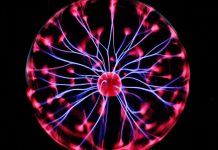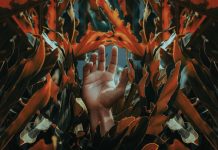The Garden Reaches
The most remarkable thing has happened—
I exist, and you,
reading this.
The clack of beak on beak
and skull on skull
as hummingbirds divebomb one another
in the garden reaches
my ears and that sound exists
and what it testifies to,
too, is equally real.
Let the hibiscus nod its assent
as the hummingbird drinks
from the blossom
for which it has so viciously fought.
Let beak meet beak and not blank air
when the buzzing birds
defend their feeding grounds,
let tongue find nectar
where red invited the bird to gorge.
Step into the garden.
Touch the flower, trembling in the wake.
Touch this word for flower,
signaling to you
from across the page.
Is there any nectar there?
This word in your hands,
accosting your eye,
touch it.
This word.
And this.
Can you?
Wake
The universe begins to look more like a great thought than a great machine.
–Sir James Jeans
Then, dear Lord, what so troubles your dreams?
Continents rise magnificently from the sea
and grow green, seethe
with plants and animals—
but, Lord, they age and decay,
disembowel or swallow whole to digest slowly,
or plant their eggs in one another’s flesh
in this dream from which I pray
You’ll wake.
My childhood friend was born with holes in his heart
and died at 30, afraid, trembling.
Trembling, Lord.
(Are You trembling in your sleep?
Wake.)
I stood by his open grave prettified with Astroturf.
And 70 people died at a funeral in Mozambique yesterday
by drinking beer contaminated with crocodile poison.
Speaking of which, crocodiles are poisoned
because they were born with teeth,
and hungry, and strong.
A man crying I can’t breathe I can’t breathe I can’t breathe
provokes not the slightest adjustment
of the policemen’s grip
and he drowns in broad air.
Why these tortured thoughts?
Because we are so in need of comforting, I long to comfort You.
Wake into a better state of mind,
into whatever light
warms the world in which You sleep.
Do not let your heart be troubled,
and cease to trouble ours.
Wake.
Undream us.
Vow
Beauty brings copies of itself into being.
–Elaine Scarry
In my life I have made no vow of undying love
except to moments like this one,
as water flames out, flung
from the dog bowl, over the hydrangea leaves—
a sunlit wing extended and sparkling
for a bare moment
before it collapses into the earth—
the very Icarus of beauty.
Why is it so tempting
to say the love of a thing
is dependent on its loss?
Is this the temptation into which God fell
when She made these ants
crawling across my open book,
intricate mechanisms
which will live a few weeks,
perhaps die naturally, perhaps be crushed
by a human or animal,
or be exterminated with laboratory chemicals?
How can God bear to bring so much into being
in Her zeal to create—
saying It is good, It is good
at each genesis—
only to let it all so quickly die?
Beauty brings copies of itself into being says the philosopher.
So the queen ant produces brood after brood,
sends her grotesque offspring,
each animate replica,
out into the world to work before succumbing
to the common fate of every spark.
So the artist tries to record the moment water
was fanned in air and lit
like the appendage of a transparent bird
hovering over the hydrangea leaves.
So a mosquito bites a stray dog
and heartworm larvae enter its bloodstream,
settle and grow in its heart
before sending their own larvae into the blood
to be transported
through a mosquito to the next host.
So beauty brings
copies of itself
into being.
And who are we to say
the water in flight,
the ant,
the artist,
the work of art,
the mosquito,
the dog,
and the heartworms
are not equally beautiful to God,
who experiences
the birth and life and death
of each being and event simultaneously?
Does She suffer as She rejoices?
Is She consoled
by the successive generations of Her creation?
I could not presume to know the Maker’s mind,
but I know something of my own—
I could not bear
to make such magnificent and fleeting things.
But being here,
having been brought, briefly, into being,
I gather in my mind the moments I glimpse a marvelous life
or witness a startling arrangement of matter.
Though these things all pass away, I vow
to harbor them until,
like heartworms,
they bring so many copies of themselves into being
I die of it.
About the author:
Luke Hankins is the author of a collection of poems, Weak Devotions, and a collection of essays, The Work of Creation: Selected Prose. He is the founder and editor of Orison Books, a non-profit literary press focused on the life of the spirit from a broad and inclusive range of perspectives.












